Blending culinary excellence with sustainability is not just possible – it’s profitable: Bálamo’s story
A Madrid-based restaurant, supported by Race to Zero Accelerator, Hostelería #PorElClima, shows that green innovation in the hospitality industry can reduce emissions and save costs.
By Climate Champions | September 4, 2024
In brief
Bálamo Restaurant in Alcorcón, Madrid, is pioneering sustainable practices in the hospitality sector under the leadership of Managing Partner Oscar García Sáiz. Driven by a vision to integrate culinary excellence with environmental responsibility, Bálamo has implemented several impactful initiatives:
- Installed solar panels in 2021, achieving a standard carbon savings of 249.86 tonnes and avoiding 296.70 tonnes of CO2 emissions — equivalent to planting 406 trees.
- Installed gas and grease retention panels to capture pollutants from kitchen fumes, reducing air pollution.
- Recycles 100% of used vegetable oil, converting 23,500 litres into biodiesel in 2023, preventing the contamination of 23,500,000 litres of water.
- Uses grease separators to recycle 24,000 litres of wastewater annually, conserving water and protecting the ecosystem.
- Employs natural vertical gardens to improve air quality, generating oxygen and reducing harmful gases.
–
In Alcorcón, Madrid, Bálamo Restaurant is setting a new standard for how the hospitality industry can tackle environmental challenges. As the climate crisis urges every sector to reconsider its environmental impact, Bálamo, under the leadership of Managing Partner Oscar García Sáiz, demonstrates that blending culinary excellence with sustainability is not just possible – it’s profitable.
Since its inception, Bálamo Restaurant has been driven by a clear vision: to create a space where culinary excellence and environmental responsibility go hand in hand. “Since our inception, we have had a clear vision: to create a space where culinary excellence and environmental responsibility go hand in hand. This insight arose from a deep reflection on the impact of the hospitality industry on the environment and the need to act responsibly,” says García Sáiz. This guiding principle has shaped every decision the restaurant has made, from the kitchen to the rooftop.
The global food industry is a major player in environmental issues, contributing to over 34% of greenhouse gas emissions. Restaurants, which are a critical part of this industry, often come under fire for their heavy resource use and waste generation. Bálamo Restaurant has tackled these challenges head-on with a commitment to sustainable practices.
In 2021, Bálamo installed solar panels, bringing about substantial environmental benefits, including a standard carbon savings of 249.86 tonnes, the avoidance of 296.70 tonnes of CO2 emissions – an impact equivalent to planting 406 trees.

Balamo’s solar panels. Image: Balamo.
Recognizing the harm caused by kitchen fumes, Bálamo also installed gas and grease retention panels on its rooftops. These panels capture greasy particles and gases before they escape into the atmosphere, effectively reducing air pollution. As García Sáiz explains, “We noticed that the output of the kitchen fume extractors was releasing gases and grease into the atmosphere. After discussing it with Roberto, from the company Bioxigema, and studying the case, he gave us the option of proceeding with the installation of panels with mesh filters with which to retain in their entirety the fatty particles in the form of solid/liquid, gases, which are trapped in the mesh filters and the greases in liquid state go to a retainer for subsequent recycling, preventing it from going to the sewer or the atmosphere.”
If we hadn’t recycled this oil, it could have contaminated 23,500,000 litres of water
The restaurant recycles 100% of the vegetable oil used in their kitchens. In 2023, this amounted to 23,500 litres of used oil, which was transformed into biodiesel – a cleaner alternative to traditional fuels. “We recycle 100% of the vegetable oil, which we use for frying. After use, this oil is deposited in approved drums for proper storage and transport to the management plant, where this oil is treated and then transformed into biodiesel and which is up to 10 times less harmful to the environment than common diesel. If we hadn’t recycled this oil, it could have contaminated 23,500,000 litres of water,” García Sáiz notes.

Managing Partner Oscar García Sáiz. Image: Balamo.
Another significant challenge for Bálamo was managing the waste produced from cleaning utensils and kitchenware. To address this, they installed a grease separator connected to their washing tunnels and sinks. “Our washing tunnels and sinks are connected to a grease separator with a capacity of 6 cubic meters, which is installed before the public sewerage network to prevent all this grease and dirt from going into our waters. Every 3 months the grease separator is emptied, by means of a tanker truck that takes this waste to the plant where it is treated to give it a new use.” This system captures all the grease and dirt before it reaches the public sewer system, recycling around 24,000 litres annually. This not only conserves water but also prevents pollutants from entering the ecosystem.
Cleaning and maintaining the kitchen extraction system is another crucial practice at Bálamo. The team ensures that the system is cleaned regularly to prevent the build-up of fatty substances that can emit harmful gases or pose fire hazards. Regular maintenance also ensures that kitchen equipment runs efficiently, reducing energy consumption and costs.
Beyond the kitchen, Bálamo has embraced sustainability with natural vertical gardens. Composed of native plants, these gardens improve air quality, provide oxygen, and reduce harmful gases. “A green environment always brings beauty, tranquility, harmony and other aspects that can end up being that push of positivism that we need in our day to day,” says García Sáiz. Each square meter of vegetation cover generates enough oxygen for one person per year, traps 130 grams of dust, and absorbs 0.67 tonnes of harmful gases annually.
Bálamo’s efforts are part of a broader movement among small and medium-sized enterprises (SMEs) to prioritize sustainability – and build businesses that are fit for the future. SMEs constitute 99% of the European Union’s food industry, and their collective action can significantly impact global efforts to combat climate change.
Being part of Race to Zero Accelerator, Hostelería #PorElClima – as a part of a wider project with campaign member Coca Cola Spain – has also been vital for Bálamo. The network encourages collaboration among businesses committed to reducing their environmental impact, providing a platform for sharing resources and strategies.
Commenting on the potential for the hospitality industry to adopt sustainable practices, García Sáiz explains: “With regard to the hospitality industry, it has a significant impact on the environment due to the consumption of natural resources, waste generation, and carbon emissions. Therefore, thinking about the future, it is essential that businesses in this sector take responsibility for reducing their ecological footprint and adopt more sustainable practices to protect the environment.”
As climate change continues to pose significant challenges, the need for sustainable business models is more pressing than ever. Bálamo Restaurant’s journey shows that when it comes to protecting the environment, every initiative counts. It’s a reminder that meaningful change often starts small – with one restaurant, one decision, and one step towards a more resilient, nature-positive and net zero world.



